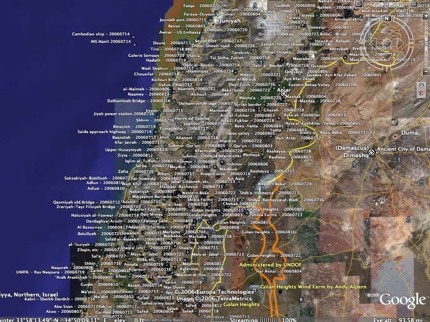For the majority of Arabs, Hezbollah won, Israel is no longer the undefeatable army
CAIRO, Egypt (AP) _ Babies have been named “Hezbollah” and “Nasrallah.” Even some die-hard secularists are praising the Shiite fundamentalist militia in the wake of its cease-fire with Israel _ saying its fighters restored their feelings of honor and dignity.
But behind the outpouring of support for Hezbollah in recent days, some in the Middle East are increasingly worried about the rising power of religious extremists.
“The last thing I expected is to fall in love with a turbaned cleric,” wrote Howeida Taha, a strongly secular columnist in Egypt, writing in the Al-Quds al-Arabi newspaper this week. “I don’t like them, and of course they will never like somebody like me … (but) I feel I’ve been searching for Nasrallah with my eyes, heart and mind. I feel Nasrallah lives within me.”
Yet, she added, “No matter how much we admire Hezbollah’s fighters’ bravery, the last thing we want to see is the rise of a religious party in Egypt.”
Around the Arab world, Hezbollah was widely seen as the victor in the 34-day war with Israel, because of the tougher-than-expected resistance it put up under Israel’s relentless bombardment and heavy ground assaults _ and because it survived an onslaught that Israel had initially wanted to cripple the guerrilla group.
As a result, Hezbollah and its leader, Sheik Hassan Nasrallah, have emerged as popular heroes.
“Thanks be to God and to Hezbollah,” read the banner of an opposition independent weekly, Al-Destour, in Egypt on Wednesday.
More than 120 babies born during the war have been named after Nasrallah in the Egyptian city of Alexandria, says the official registrar there. In Gaza City, there are at least a dozen newborns named Hezbollah, (Party of God) Nasrallah (Victory from God) or Hassan.
On an Islamist web site for youth, based in Egypt, many women wrote saying they would love to marry someone like Nasrallah.
“I want to marry one of Nasrallah’s three boys and dedicate myself to resistance and pride of my (Islamic) community,” said Noha Hussein, a university student in Cairo.
Necklaces and key chains with his image are now in style, the web site notes.
Much of the enthusiasm has come from finally seeing an Arab military force dig in against Israel.
Arab nations fought several wars with Israel _ in 1948, 1956, 1967 and 1973, as well as Israel’s previous two invasions of Lebanon. The first three were heavy defeats for Arab armies, and though Egypt’s army saw dramatic successes in 1973, the battle had swung to Israel’s favor by the time it ended.
In the eyes of many Arabs, Hezbollah’s performance shook the Israeli military’s image of invulnerability.
“The Lebanese people may have lost a lot of economic and human resources …. but away from figures and calculations, they have achieved a lot of gains,” said Youssef al-Rashed, a columnist for the Kuwaiti daily Al-Anba.
“Its heroic resistance fighters have proven to the world that Lebanese borders are not open to Israeli tanks without a price,” he wrote Tuesday. “Lebanon was victorious in the battle of dignity and honor.”
Also, the image of a guerrilla force doing what a regular army could not has apparently deepened the popular resentment toward Arab governments.
“The crux of the problem in Lebanon is that a political movement became bigger than the state,” said Mamoun Fandy, the director of the Middle East program at London’s International Institute for Strategic Studies. “The same syndrome _ a perceived lack of legitimacy of governments that are being challenged by armed political movements _ can be seen in many Arab and Muslim states. …. Their message is that movements can do what states failed to do, and can restore the honour that governments have squandered.”
Awni Shatarat, a Palestinian refugee from Baqaa camp, is among those who strongly view Hezbollah as victorious.
“Israel was defeated by a small group, which succeeded in demolishing the image of the undefeatable army,” he said.
But others are far more critical of Hezbollah and pessimistic about what the war might bring.
Jordan’s former information minister, Saleh Qallab, said Hezbollah’s new strength could now be turned against the anti-Syrian, pro-democracy movement that gained power in Lebanon last year _ “which means that a civil war is imminent in Lebanon, unless a miracle occurs.”
“Do we call this a victory?” he said.

